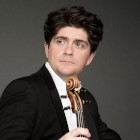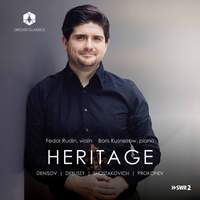Interview,
Fedor Rudin on Edison Denisov
 Cross-pollination between French and Russian music is often talked about, and for good reason - in the Ballets Russes above all, and elsewhere across the orchestral spectrum. It's not so common to pick up on this theme in the context of chamber music, though, and that's exactly what a new album from Franco-Russian violinist Fedor Rudin does. Juxtaposing works by Shostakovich and Prokofiev for violin and piano with a selection of pieces by Edison Denisov, he draws out the relationship between Denisov and the French style of Debussy.
Cross-pollination between French and Russian music is often talked about, and for good reason - in the Ballets Russes above all, and elsewhere across the orchestral spectrum. It's not so common to pick up on this theme in the context of chamber music, though, and that's exactly what a new album from Franco-Russian violinist Fedor Rudin does. Juxtaposing works by Shostakovich and Prokofiev for violin and piano with a selection of pieces by Edison Denisov, he draws out the relationship between Denisov and the French style of Debussy.
I spoke to Fedor about these connections, and the complex and difficult outline of Denisov's life as a composer.
Compared to other Russian composers of his era, Edison Denisov is relatively poorly known. Who was he, and why does he remain relatively obscure today?
Edison Denisov was one of the leading figures in 20th century avant-garde Russian music, alongside Alfred Schnittke and Sofia Gubaidulina; they were the so-called “Moscow Troika”. He got blacklisted in 1979 together with six other Soviet composers (including Gubaidulina) for their participation in festivals abroad by the Composer’s Union leader of that time, Tikhon Khrennikov, who called their music “pointless, noisy mud instead of real musical innovation”.
Although Denisov constantly suffered a lot from the political situation in his own country - which also prevented him from communicating much with foreign organisations even when he received official invitations to performances of his works - he always remained true to himself, followed his own musical path. He also chose to stay in Russia (by 1991, out of Khrennikov’s Seven, only three composers had remained, all the others having left to live abroad). After the dissolution of the Soviet Union, when everything was finally slowly getting better for Edison Denisov, he had a terrible car accident in 1994 that he barely survived, and of whose consequences he died two years later in Paris. His very early death just when he was finally able to travel and, so to say, build his artistic path internationally and freely, of course played an immense role in his remaining relatively obscure.
Denisov studied composition with Shostakovich for a time; how much influence of Shostakovich do you hear in Denisov’s music?
Denisov’s relationship with Shostakovich is a complex one. On one hand, it was Shostakovich who, after several exchanges of letters, convinced Denisov to come to Moscow to study composition, after he had finished his mathematic studies in his hometown of Tomsk. There is surely much of Shostakovich’s influence in Denisov’s early works (for example, his early vocal cycles, his Piano Trio No. 1, or even the Three Concert Pieces that are recorded on Heritage). Later, Denisov practically rejected Shostakovich, accusing him of going “the wrong way of Hindemithian two-voice polyphony”. But one can nevertheless hear some of Shostakovich’s influence even in Denisov’s later works, for example his Second Symphony.
He was also a fan of Debussy – orchestrating the unfinished opera Rodrigue et Chimène, two sections of which you’ve arranged for violin and piano here. Did Debussy’s approach to composition inform Denisov’s?
He was not only a fan of Debussy, but of French Impressionism in general and he was an avid Francophile. He spoke fluent French and some of his French composer colleagues admired him for sometimes knowing French literature better than they did! I would say that there is definitely a notable influence of Debussy in Denisov’s aesthetic of orchestration, not only in his completion of Rodrigue et Chimène, but also in his own works, be it for symphony orchestra or for chamber ensembles.
Denisov seems to have fared particularly badly under the Soviet control of the arts, being blacklisted by Khrennikov in 1979, accused of various artistic faux pas and subject to a performance ban on his works. What was it about his music that drew such criticism from the authorities?
Denisov was a principled artistic figure who never complied with the requirements and doctrines of the regime. This of course caused him a lot of complications. The main reason was his curiosity about, and defence of, modern Western music (he regularly illegally brought in scores from abroad and organised clandestine meetings to study and discuss them with other composers and students at his apartment in Moscow). At that time this was particularly against the dogma of “music for the Soviet nation and people” that was promoted by the authorities.
Certainly the fact that Denisov was often invited abroad and his works were generally acclaimed and well-received in the West, while his native country was completely overlooking him, also played a role in the relationship he had with the Soviet regime. He was in close contact with Western composers such as Pierre Boulez, Henri Dutilleux and Luigi Nono, and even when they issued official invitations for him to go abroad through their countries' embassies, the Soviet authorities would do everything possible to prevent him from going, sometimes naming him “undisposed” or “ill”.
Since the dissolution of the Soviet Union thirty years ago, much has changed in Russia and many aspects of Soviet-era art and culture have been re-evaluated in one way or another. Do you see much of a revival in interest in Denisov’s music taking place in his home country?
There is definitely a revival in interest in Denisov’s music in Russia since the end of the Soviet Union. 2019 saw Denisov’s 90th anniversary, which was celebrated across the whole country at several festivals - in his native Tomsk, Moscow, St Petersburg, and also the Diaghilev Festival in Perm just to name a few.
His ensemble and orchestral works are being regularly performed, both by leading contemporary music ensembles such as the MCME (Moscow Contemporary Music Ensemble) and Studio New Music, but also by the State Academic Symphony Orchestra named after Svetlanov for example, who recently performed his Symphony No. 2 and his “Painting” at the Moscow Philharmonia.
Fedor Rudin (violin), Boris Kusnezow (piano)
Available Formats: CD, MP3, FLAC, Hi-Res FLAC



